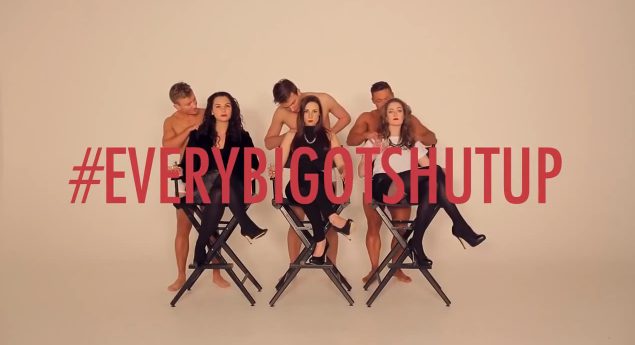Blurred Lines, Not So Much: Double Standards at Play for Women in Music Videos
A "Blurred Lines" parody video in which men dance shirtless was briefly removed from YouTube after being flagged as "inappropriate," sending a clear message that the idea of women dominating submissive men is unsuitable.

Tsion Abera is a freshman at Dartmouth College and one of Rewire‘s youth voices.
Date rape, nudity, sexual objectification, and the hottest song of the summer: In March, Robin Thicke’s “Blurred Lines” music video, featuring Pharrell and T.I., was released on YouTube. The song is said to perpetuate rape culture by rejecting the concept of clear sexual consent.
The song’s lyrics include “You’re an animal,” and “I hate these ‘Blurred Lines’ / I know you want it.” Rather than viewing women as actual human beings, Thicke portrays women as animals starved for sexual gratification; the “blurred lines” between consent and rape prevent intercourse.
The video has received even more negative attention from feminists and others, because in it three topless women are seen dancing and posing, while the three men—Thicke, Pharrell, and T.I.—are seen well-dressed, in suits. The video demonstrates a clear power dynamic, in which the men are dominant and the women are treated simply as sex objects.
In response, law students Adelaide Dunn, Olivia Lubbock, and Zoe Ellwood created a parody of “Blurred Lines.” “Defined Lines” is a feminist twist on the tune that calls for social change and respect for women. “Defined Lines” reverses the roles of sexual exploitation and promotes women’s empowerment rather than submissive objectification of the kind seen in the original video. The “Defined Lines” video features three shirtless men in boxers who are dancing and serving three dressed women while they deconstruct the notion of male dominance.
In early September, “Defined Lines” was removed from YouTube after being flagged as “inappropriate.” Though the parody was later returned to YouTube, the damage was already done. The removal of “Defined Lines” sent a message that the idea of women dominating submissive men is unsuitable because of societal gender roles that portray women as submissive to men. Thicke’s “Blurred Lines” video sexually objectifies women and includes topless women dancing. The “Defined Lines” parody mirrors Thicke’s video with male dancers. So why was “Defined Lines” taken off YouTube, but “Blurred Lines” wasn’t?
While objectifying women in music videos is socially acceptable, the same standard held toward men is “inappropriate.” The objectification of women in the music industry has become a widespread trend in society. Hip-hop and pop videos include racy clothing and actions. These music videos often demonstrate a misogynistic gender dynamic. Oftentimes, women are seen dancing on men as the men sing about wealth, sex, and power. Too many male artists—many of them at the top of their genres—join Robin Thicke in being notorious for the objectification of women in their music videos.
In addition to male artists sexually objectifying women, female artists use their own sex appeal to increase viewers and profit. A study by the University of Missouri College of Arts and Science concluded, “It has been known that music videos featuring male artists often sexually objectify women, but our study shows that many female artists are objectifying themselves in their music videos.”
To this I say, a woman’s body is her own. Women have every right to do with their bodies as they please. Women have every right to wear—or not wear—whatever they want. Even so, the double standard of power dynamics in music videos is troubling.
In particular, the double standard is blatantly obvious with the temporary removal of the “Defined Lines” parody video. Male domination in music videos has become a social norm in which men are seen as powerful and women are seen as submissive sex objects. This social norm is reflected in music lyrics such as those sung by Robin Thicke, who, in his song, blatantly promotes date rape. In temporarily removing the “Defined Lines” parody, YouTube reaffirmed the dangerous idea that women are submissive objects while men are rightfully dominant.
The fact that the “Defined Lines” video was removed even for a brief time is a clear indication of how welcoming music videos are to the idea of women in charge.
